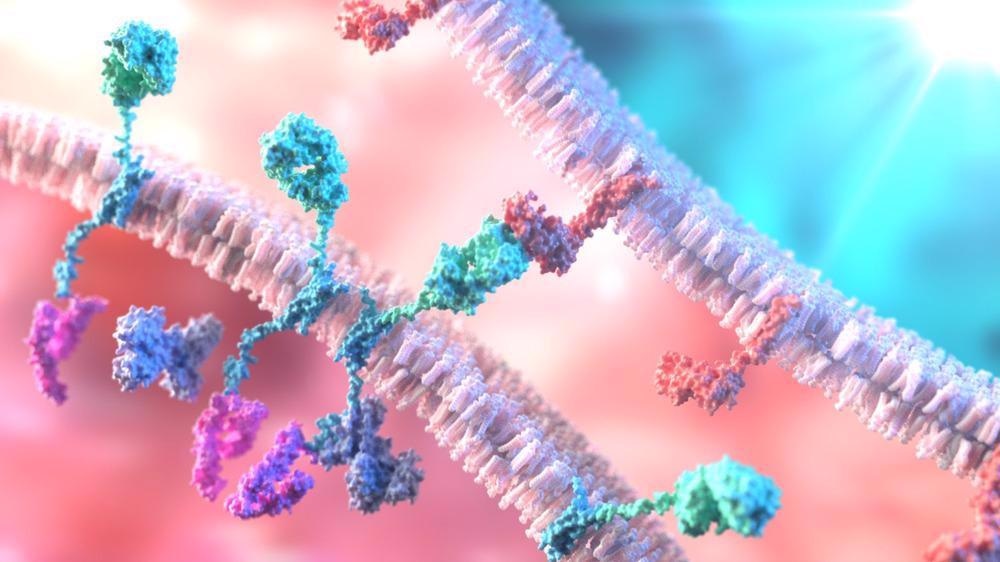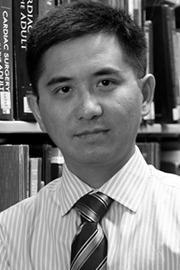My name is Jun Huang. I am currently an assistant professor at the Pritzker School of Molecular Engineering at the University of Chicago. My work in the CAR T-cell field comes from a number of motivations. One of my key motivations came from a little girl I met when I was a postdoc at Stanford University. Unfortunately, she was diagnosed with brain cancer. I visited her a few times before and after she had surgery at Stanford Hospital.
The surgery had a big impact, and I was happy for her, but then just after one year, the tumor started to relapse, but this time there was no treatment available to help her, and she sadly passed away. Currently, there is no good treatment for brain tumors like hers, but CAR T-cell therapy has shown excellent efficacy against hematologic cancers, like leukemia and large B-cell diffuse lymphoma.
There is a really inspiring story from Emily Whitehead, the first pediatric patient received CAR T-cell therapy in 2012. This was almost ten years ago, and right now, she is still cancer-free and living a normal life. This made me want to engineer better CARs to treat brain tumors, but so far, brain tumors do not respond to CAR T-cell therapy.
In my opinion, the development of CAR T-cell immunotherapy is just getting started. The CAR can be better designed, and there are many ways to improve CAR T-cell therapy, so I hope to be able to contribute to this and help more cancer patients.

Image Credit: Alpha Tauri 3D Graphics/Shutterstock.com
What is T-cell therapy, and how does it work?
T-cell therpay is a type of immunotherapy against cancer and other immune-related diseases. There are two major types of T cells . One type of T cells are cytotoxic or killer T cells, which can directly kill infected cells or cancer cells. Another type T cells are helper T cells, which help other immune cells to execute their the immune functions. For example, helping the cytotoxic T cells to kill tumor cells and help B cells to make antibodies.
Can you describe how CAR T-cell therapy works and its advantages compared to other available treatments for cancer?
Depending on the cancer type and stage, cancer treatment be very different. For example, it may be possible to have surgery, radiation, chemotherapy or targeted therapy. In recent years, immunotherapy has become a very powerful branch of cancer therapy. There are currently two types of immunotherapy, one of which is checkpoint blockade therapy – using antibodies to block the inhibitory signaling pathway, which turns off the T-cell effector functions. Another major branch of immunotherapy is adoptive T-cell therapy, including CAR T-cell therapy and TCR-T cell therapy.
CAR T-cell therapy involves engineering, transducing and expressing a chimeric antigen receptor (CAR) on T cells. CAR T cells can recognize and kill cancer cells, much like a living drug. After being infused into the patients, the CAR T cells not only can kill the cancer cells, but they also gain a cell ‘memory’ - they remember those kinds of cancer cells and can effeciently kill them in the future. For example, in leukemia patients, tumor cells can be continuously generated, but the memory CAR T cells will stay in the patient’s body, remembering the cancer cells, and continuously killing the freshly made tumor cells.
CAR T-cell therapy is different from checkpoint blockade therapy because checkpoint blockade therapy uses antibodies to block the inhibitory signal pathway delivered by the cancer cells. CAR T-cell therapy is also different from TCR-T immunotherapy because TCR T-cell therapy uses T-cell receptors to recognize and kill the tumor cells.
CAR T-cell Therapy
How has CAR T-cell therapy helped to accelerate the field of immunotherapy? Are you hopeful that we will see continued technological advancements within this field and new treatments being developed?
As I mentioned before, CAR T-cell research is just getting started. According to our and other colleagues’ studies, despite extensive research, compared to TCR signaling, the current CAR signaling is not good. Although several generations of CARs have been developed, there is still significant room for improvement.
Although we have already seen magnificent success of CAR-T cell therapy in treating hematologic cancer, one major limitation is that it cannot yet be used to treat solid tumor. Because ~90% of human cancers are solid tumor, if we can enable CAR-T cell therapy to treat solid tumor, this will offer huge benefits to most cancer patients.
Progress towards treating solid tumors is still limited, but I believe that many scientists are working on this problem, either by designing new CARs or by making an existing CARs more efficient and safer.
Do you believe that CAR T-cell therapy could potentially be used to tackle some of the world’s most challenging diseases?
I think so, yes. Cancer is one of the most challenging diseases where CAR T-cell therapy has already proved its efficacy, at least in hematological cancers. People are trying to use the idea of a CAR to treat other diseases, for example, heart disease, which is the number one cause of death in terms of disease mortality. Similarly, CAR-T cell therapy can be extended to treat autoimmune diseases. There are lots of ways to utilize CAR T-cell biology, and once we know the molecular mechanism of a specific disease, we will always have the flexibility to extend it to other areas of treatment.
Your research focuses on the fundamental mechanics behind the immune system, with a particular focus on T cells. Can you describe some of the research you have carried out and what you’ve discovered so far?
People often ask me if I am focused more on basic research or translational research, but I do not tend to differentiate between the two because, as a scientist, I do not know when research can be translated and when it cannot.
The developer of the PD-1 immunotherapy won the Nobel prize four years ago. Dr. Honjo discovered the PD-1 molecule, but at that time, he probably did not realize his discovery would lead to the development of PD-1 checkpoint blockade therapy able to treat multiple cancers. These kinds of basic research often lead to the final translational applications.
Doing translational research is hard without a basic understanding. In terms of CAR T-cell immunotherapy, we know that CAR T cells can treat, for example, large diffuse B-cell lymphoma. We are currently studying this and finding that half of the patients have a complete response, while the other half have no response. We wanted to know why, when using the exact same procedure and the exact same CAR, some patients responded and some did not.
We looked at the molecular mechanisms, to begin with, comparing CAR T-cells between responders versus non-responders. One initial observation is that the CAR T cells in responders quickly expand and proliferate, but those in non-responders quickly disappear. We might assume that the CAR T-cell proliferation is an indication of the response, but for certain patients, CAR T cells start to proliferate, but the patient finally has a tumor relapse. By tracking and assessing CAR T-cell differentiation in vivo over time, we discovered that the CAR T-cell have very different differentiation stages which might function very differently. Hopefully, with this in vivo knowledge, we could potentially develop better CAR T-cell therapy to help patients.

Image Credit: BikerBarakuss/Shutterstock.com
The immune system is one of the most complex systems within the human body. What has been your biggest challenge so far when studying it?
As the immune system is so complex, you can change many things once you change one thing. For example, during the developmental process, T cells need to be trained to tolerate healthy tissues because we do not want the T cells to kill healthy cells or damage healthy tissues.
We do, however, want the T cells to be very sensitive to foreign cells.
Sometimes the difference between a ‘self’ and a foreign antigen could be just a few amino acids, and the T cells must be able to differentiate such a minor difference and only trigger an immune response against the foreigners.
It is tricky to balance this. If T cells overreacts, it can develop autoimmune diseases, but if that T cells are less sensitive, then infections could dominate and cause severe issues. Any dysfunction related to the immune system is really hard to treat due to its complexity.
Despite HIV and cancer being two different diseases, the mechanisms behind treating them may be the same. How do you believe we can tackle these diseases?
Their mechanisms are not the same, but both are related to T cells. I do believe that immunotherapy is going to be the future of cancer treatment because we are aiming to utilize our own immune systems to fight against cancerous mutations occurring in our bodies. To me, using the patient immune system against the mutations in the patient’s body is the most natural, efficient approach with the least amount of side effects. T-cell immunotherapy has great promise.
HIV is hard to treat because it attacks CD4 T cells, paralyzing the patient’s immune system. So treating HIV is also related to T cells, even though these two very different diseases have very different mechanisms.
Your research into T cells has been multidisciplinary, combining microscopy, immunology and bioengineering. How important is using a combination of life science disciplines to research? What benefits does it have to combine different fields of science?
First of all, tools should serve the science. Thus, we use different methods to study T cells. My team is made up of members with very different backgrounds, so we have a unique opportunity to be exposed to many different advanced technologies from very different fields. Many members of our team have a deep understanding of various technologies, allowing us to develop them further to answer important biological questions.
A research group where everyone has the same background may struggle to be innovative, which is why we work to bring in people with different backgrounds.
For example, chemists know how to synthesize molecules, physicists understand the fundamental laws of reactions, and biologists understand the nature of molecular and cellular mechanisms.
We want to create an interdisciplinary research environment and invite people from diverse backgrounds to participate. Together we can help each other, support each other and inspire each other to create new ways to treat the most challenging diseases, like cancer and HIV.

Image Credit: Lightspring/Shutterstock.com
What are the next steps for your research?
Right now, we are mainly focused on CAR T-cell therapy of cancer, studying CAR T-cell biology and developing better CAR T-cell therapies.
There is still significant room for improvement in our understanding and efficacy of CAR T cells. We are designing better CARs for cancer immunotherapy, with the intent of treating solid tumors. We are also working to develop a novel mRNA-based CAR T-cell therapry.
Where can readers find more information?
Read more about Professor Jun Huang here.
Read more about his lab here.
About Professor Jun Huang
Jun Huang received his MS in chemical engineering in 2007 and PhD in bioengineering in 2008 at the Georgia Institute of Technology. Prof. Huang started his postdoctoral research in immunology in 2009 at Stanford University. 
Jun Huang is an assistant professor of the Pritzker School of Molecular Engineering, Committee on Cancer Biology, Committee on Immunology, and the Graduate Program in Biophysical Sciences of the University of Chicago. His lab performs basic and translational research with the objective of developing effective vaccines and cell immunotherapies for the treatment of cancer, infection, and autoimmunity. He carries out basic immunological research, focusing on molecular mechanisms of T cell recognition and signaling at the single-molecule level. He performs systems immunology, studying the development, differentiation, and metabolism of T cells at the single-cell level. He engineers CAR-T cells, aiming at the treatment of cancer and autoimmunity. He develops new biomaterials, enabling the detection, profiling, and manipulation of T cells and other immune cells for diagnosis and treatment.